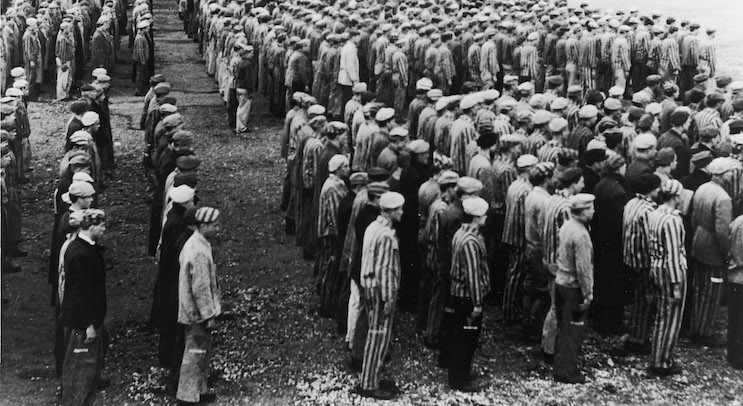UnBroken is an unusual Holocaust documentary. The film, now streaming on Netflix, tells the story of seven siblings, the Webers, who survived the war together—the only known group of siblings of that size to do so.
That statistic is obscure but evocative: Large families simply didn’t stay together and survive, if they survived at all. Amazingly, the Weber siblings weren’t broken up until they got to America and put in separate foster homes.
That doesn’t mean their family was intact, however. Their parents’ fate follows the opposite trajectory from that of the kids: For Lina and Alexander, it is a love story that becomes a tragedy.
Alexander was a German traveling salesman who met Lina Banda in Hungary and fell in love with her. Alexander was Catholic, however, and Lina’s father was an Orthodox rabbi. So Alexander converted and the two married. To start anew, they moved to Berlin with two children in tow. They had five more together in Berlin before Alexander was arrested in 1933, likely for the crime of being married to a Jew. He left prison a beaten and broken man.
Lina, meanwhile, had begun working to help Jews escape Germany, sometimes even hiding them in her family home. This further fractured the marriage, as Alexander repeatedly warned her she’d get caught. She did get caught and was eventually killed in Auschwitz.
The children—Alfons, Ruth, Senta, Gertrude, Renee, Judith, and Bela—were then arrested as well and housed in a local hospital. When they were temporarily sent home, a farmer named Arthur Schmidt, who was a friend of the family, smuggled them out of Berlin and to his and his wife Paula’s farm in Worin. The mayor of Worin was the only one besides the Schmidts who knew of the Webers’ presence in town, and he helped forge ration tickets to make sure the kids had enough to eat.
The Weber children repeatedly found themselves saved by righteous gentiles. At one point they were cared for by the famous Catholic social worker Margarete Sommer (although the film misses an opportunity to talk about Sommer’s work); later, the Berlin house they were hiding out in was bombed and they were trapped underground until Schmidt, who was in the house next door, dug them out. Eventually the family made it into the care of the Joint Distribution Committee and out of Europe—but without their father. They were only permitted to emigrate by claiming to be orphans. Alexander survived by renouncing his conversion to Judaism, though he too eventually made it out of Germany.
The siblings weren’t all reunited until 1986. Ten years later, at a family gathering, Alfons presented his siblings and their families with a brief written memoir of their story, which later became the backbone for the documentary, helmed by Beth Lane, daughter of the youngest Weber sibling.
Yet the movie has nothing resembling the triumphant tone of the usual stories of survival, and in that sense it’s likely a preview of the Holocaust documentaries to come. The amount of time that has passed means that even when we meet the survivors themselves on-screen, we won’t be meeting any more heroes who saved them. (There is only one living recognized member of the Righteous Among the Nations residing in Israel, the 90-year-old Jarosława Lewicka.) The Schmidts died a decade after the war and a good half-century before they were added to the Yad Vashem registry of righteous gentiles. The mayor of Worin, Rudolph Fehrmann, died soon after the war. We see his grandson meet Lane in the film.
There isn’t much information about Lina Weber herself, though there is surely an incredible story there; the family assumes she was part of an underground rescue organization, but the rest is likely lost to history.
Sommer died in 1965. In the film, we are told that an unnamed chaplain was sheltering refugees in another part of the same building, and that he and Sommer didn’t know about each other’s hidden Jews.
There’s a bittersweet point here: There are surely far more righteous gentiles than we’ll ever know of. Many told no one, not even their own children, about their wartime deeds. The world produces more heroes than we think, and therefore more than can be properly honored. Perhaps the only way to honor them, then, is to always assume humanity’s in better shape than it might seem at its darker moments.


















